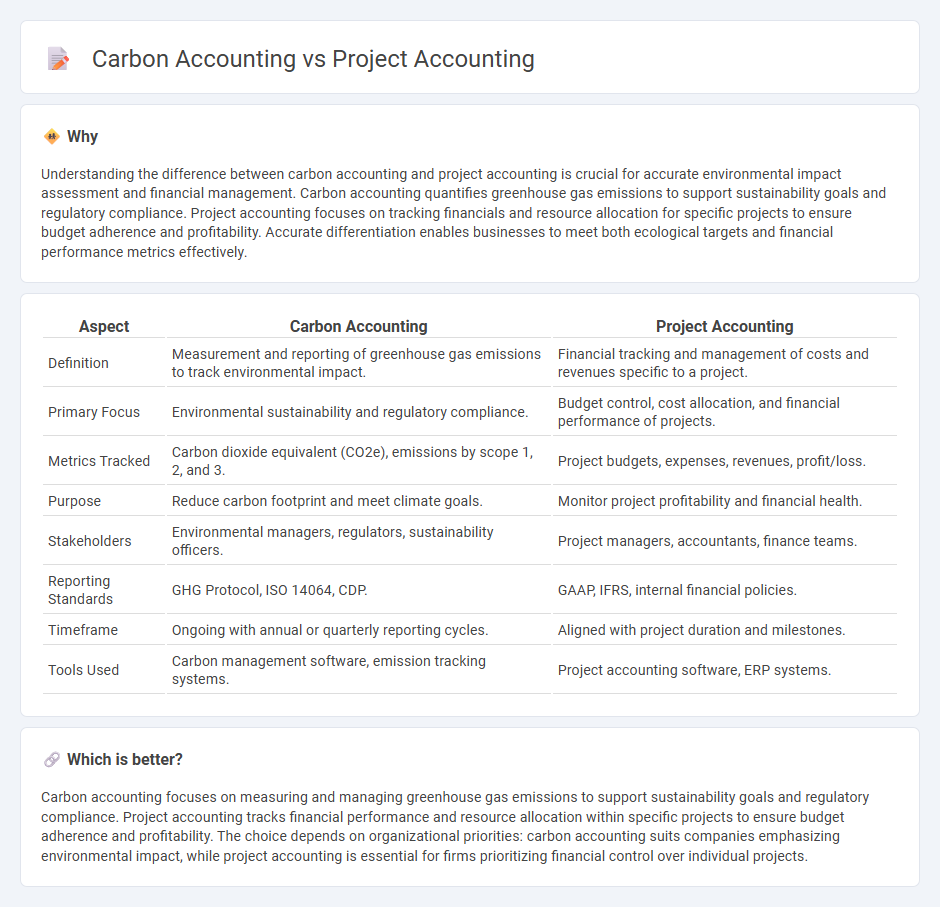
Carbon accounting systematically measures greenhouse gas emissions to track environmental impact, while project accounting focuses on financial management and budgeting within specific projects. Carbon accounting relies on data such as CO2 equivalents and emission sources, whereas project accounting emphasizes cost tracking, resource allocation, and profitability analysis. Learn more about how these distinct accounting practices influence sustainability and financial performance.
Why it is important
Understanding the difference between carbon accounting and project accounting is crucial for accurate environmental impact assessment and financial management. Carbon accounting quantifies greenhouse gas emissions to support sustainability goals and regulatory compliance. Project accounting focuses on tracking financials and resource allocation for specific projects to ensure budget adherence and profitability. Accurate differentiation enables businesses to meet both ecological targets and financial performance metrics effectively.
Comparison Table
| Aspect | Carbon Accounting | Project Accounting |
|---|---|---|
| Definition | Measurement and reporting of greenhouse gas emissions to track environmental impact. | Financial tracking and management of costs and revenues specific to a project. |
| Primary Focus | Environmental sustainability and regulatory compliance. | Budget control, cost allocation, and financial performance of projects. |
| Metrics Tracked | Carbon dioxide equivalent (CO2e), emissions by scope 1, 2, and 3. | Project budgets, expenses, revenues, profit/loss. |
| Purpose | Reduce carbon footprint and meet climate goals. | Monitor project profitability and financial health. |
| Stakeholders | Environmental managers, regulators, sustainability officers. | Project managers, accountants, finance teams. |
| Reporting Standards | GHG Protocol, ISO 14064, CDP. | GAAP, IFRS, internal financial policies. |
| Timeframe | Ongoing with annual or quarterly reporting cycles. | Aligned with project duration and milestones. |
| Tools Used | Carbon management software, emission tracking systems. | Project accounting software, ERP systems. |
Which is better?
Carbon accounting focuses on measuring and managing greenhouse gas emissions to support sustainability goals and regulatory compliance. Project accounting tracks financial performance and resource allocation within specific projects to ensure budget adherence and profitability. The choice depends on organizational priorities: carbon accounting suits companies emphasizing environmental impact, while project accounting is essential for firms prioritizing financial control over individual projects.
Connection
Carbon accounting integrates with project accounting by tracking greenhouse gas emissions associated with specific projects, allowing businesses to quantify environmental impact alongside financial performance. Detailed project accounting ensures accurate allocation of carbon-related costs and revenues, facilitating compliance with sustainability regulations and enhancing corporate social responsibility reporting. This synergy supports informed decision-making for sustainable project management and investment strategies.
Key Terms
**Project Accounting:**
Project accounting tracks financial performance and resource allocation specific to individual projects, ensuring cost control and budget adherence throughout the project lifecycle. It involves detailed expense tracking, revenue recognition, and profitability analysis tailored to project goals and timelines. Discover how mastering project accounting can enhance financial transparency and project success.
Budget Tracking
Project accounting emphasizes detailed budget tracking to monitor costs, allocate resources, and ensure financial control throughout the project lifecycle. Carbon accounting tracks emissions-related expenses and investments to manage environmental costs and support sustainability goals. Explore how integrating both approaches can enhance financial and environmental performance in your organization.
Cost Allocation
Project accounting focuses on allocating costs to specific projects to ensure accurate budgeting, financial tracking, and profitability analysis. Carbon accounting allocates greenhouse gas emissions costs to various activities or departments to measure environmental impact and support sustainability goals. Explore deeper insights into how cost allocation varies between project accounting and carbon accounting.
Source and External Links
What Is Project Accounting? Get Started With This Guide | Deltek - Project accounting is a specialized form of accounting dedicated to tracking and managing the financial aspects of individual projects, allowing businesses to monitor budgets, costs, and revenues for effective project financial management and decision-making.
Project Accounting: A Complete Guide to Mastering Project Finances - Project accounting involves setting up project financials, budgeting, cost tracking, billing, revenue recognition, financial reporting, compliance audits, and project account closeout aligned with strategic business goals.
What Is Project Accounting? Principles, Methods & More - Project accounting manages all financial transactions in a project including cost planning, documenting expenses, billing, revenue tracking, variance analysis, and financial reporting, usually performed by project managers or dedicated project accountants.
 dowidth.com
dowidth.com